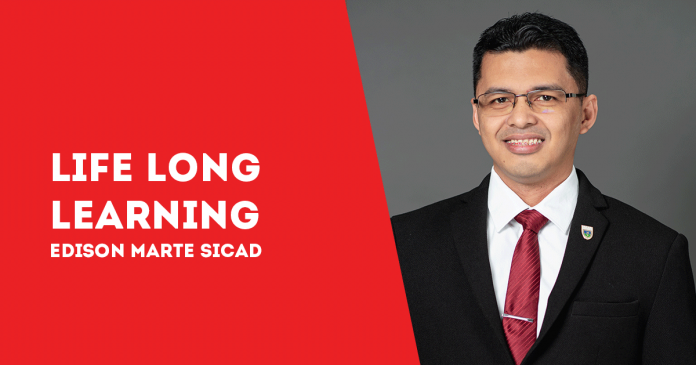
BY EDISON MARTE SICAD
“READING books is educational; however, it is anti-educational system.”
The irony of such a system is that it (although “they” would have been more appropriate) professes uniqueness and recognizes that there are different learning styles, but the assessments and the curricula are geared towards uniformity and conformity. In a way, our system of education is anachronistic: a 19th century Prussian format applied in a 21st century setting.
WHY ANTI-EDUCATIONAL SYSTEM?
Because the reading of books (meaning cover to cover) takes time. In a school system, the reading is a means to an end: grades. And this is where the dilemma lies: “Must I give more time for reading and discussion? Or should I proceed to the next lesson?”
Since teaching and learning are situated in a school calendar, a teacher has to adjust with the reality:
1. We cannot encourage as a coverage an entire book. The discussion will take forever; and some students cannot afford to buy a book. Things would get more challenging if the teacher does not have the time (even if the teacher loves reading) to read because of other preparations.
2. It is near impossible for students to choose books over gadgets. Why read the entire thing if there is a 10-minute summary (which is already a long read to them) available online? Improvement requires momentum. In reading a book, the challenge is to begin and stay on reading; because the youth of today are in a constant state of self-induced interruptions, the sustained effort needed for reading is lacking. In other words, reading is boring.
3. In relation to Multiple Intelligences, not all students are into reading. And those who are into reading are in it for pleasure and as a pastime, not for a quiz or graded recitation. Sometimes, the joy we experience in doing something is robbed by the incessant quantifying of “key result areas.”
Reading books then, to become a habit, must have no systemic objective or agenda. It is the reader’s world. The reader is not reading as a student. He is reading as a free individual: to stay on a page for one day or spend the entire day reading.
TEXTBOOKS AND EXCERPTS
Despite the good intention in “getting a taste of everything,” I do not like the approach of textbooks in providing excerpts to introduce students to literature.
I also hate summaries. I consider book summaries as the fast food of literature: intellectual health is poisoned and in the long run affects an individual’s critical literacy.
These “instant-shortcuts” give the reader a wrong perspective in the value of reading and the respect the authors deserve. The dilemma of covering more in a superficial way or choosing a few for deeper understanding may be managed in the classroom. But eventually, the exams will ruin the flow of learning. Let me repeat it. Sometimes, a scheduled exam disrupts the flow of comprehensive learning and deeper appreciation of the lessons.
Reading must be honest in itself. If the book is 300 pages, so be it. What the school system is doing is making an industry of “shortcuts into learning.” To the author who painstakingly wrote the entire book, to just read a sample may be good for the class time; but in my opinion, it blurs the value of writing and reading. The appreciation and learning also turns into a sort of speed-dating: the faster, the better.
Literature (in school) becomes learning by coverage for convenience.
Wouldn’t this be such a sweeping statement to warrant attention? And with reading and literacy programs implemented in schools, books would surely be part of the learning process. Why give such an undeserved criticism?
I am referring more to reading as a habit and not just as a subject. Some teachers and parents may have also encountered the difficulty of encouraging students to develop the habit of reading.
HOW CAN WE ENCOURAGE READING AS A HABIT AT HOME?
It begins with the grown-ups.
And just like any habit, the acquisition takes time and a lot of effort (for good habits, that is). Studies show that reading as a habit is imbibed at a young age. When children see people in the house reading, the tendency is that the child will be naturally drawn into reading. That’s why giving a child a gadget to learn and play with is counterintuitive in the long run.
Although reading books is regarded as a class activity, fundamentally, it is a family practice. It is highly suggested that parents must assign a reading place or a small library at home.
Parents may get so busy in providing food for the table that they have taken for granted providing food for the mind and for the soul. We have to go back in giving importance to the home as the primary place in rearing the child into maturity and civic mindedness, not the school, not the teachers.
When reading becomes a normal activity at home, there is an appreciation of silence as a sign of respect that someone is reading and thinking. When family members read, the discussions dwell into better ideas as the conversations are enriched by universal themes. When a child reads, he learns the value of independent thinking as a process of understanding others.
Reading may be anti-educational system, but it is surely educational at home. With the home as the primary place for reading books, this gives more meaning to the statement: “The parents are our first teachers.”/PN


